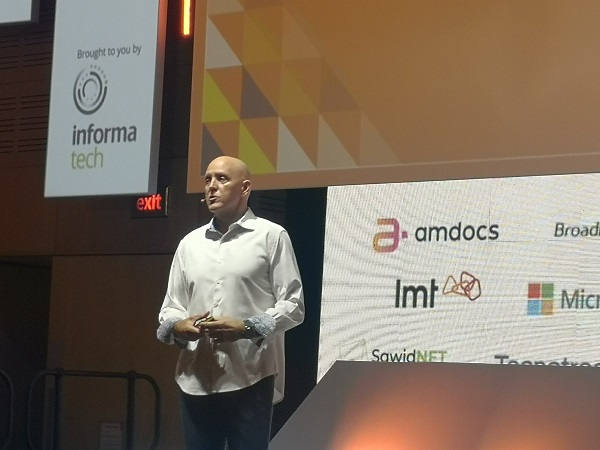What will it take for Africa to drive US$5-trillion digital economy?
What will it take for Africa to drive US$5-trillion digital economy?

Africa has the numbers, a desire to innovate and utilise technology, as well as the technical skill sets and resources to fully realise a digital economy – but the continent has to foster and sustain a technology ecosystem, relevant platforms, effective regulation and infrastructure to do so.
This is according to Paul Scanlan, chief technology officer, Carrier Business Group, Huawei Technologies, who spoke at the opening of AfricaCom 2019 hosted in Cape Town this week.
The growing need for connectivity and the technologies that underpin Africa's journey to 4IR, including AI and 5G, are focal points for the event.
According to the GSMA's Mobile Economy Report released in Kigali in June, there were 456 million subscribers by 2018 with a penetration of 44% - representing a steady growth of people accessing the internet, 239 million people (23% of Africa's population) using the mobile internet regularly.
Scanlan said if Africa wants to drive the US$5-trillion digital economy across all sectors, it has to be aware of several technologies and their impact, including AI, 5G and 3D-printing.
"If you want to drive the economy, you need to have targets, and if you have targets, you better know where you are today and you better know how to get there. You have to understand two fundamental things: what are the platform technologies and the second one, what are the enablers. Right at the bottom, if you don't have money, you can't do anything... so we start with money. But more importantly, even with the best regulatory policies, and the best technologies and the best will in the worlds, if you don't have a talent development programme, it's not going to work," he said.
Scanlan emphasised the need for infrastructure. "If you don't understand how to connect everything, gather all the data, store it effectively, have security and privacy protocols, you can't do AI properly. And if you can't use AI, you can't transform... it's really simple."
"It's all about learning, learning, learning ... you want AI to work, you need data, you want data, you've got to connect. It's about modernising and transforming industries. We want to drive the digital economy in Africa and just because we've got 3G moving ahead of 2G, that's not necessarily the key component. If you want to drive it, you need three things... platform, AI and an ecosystem."
Scanlan also underlined the importance of execution, particularly in the context of telecommunications infrastructure development. "In China, we only allocated the 5G spectrum a month or so ago, and in one city - Shenzen - we have 45 000 5G base stations."
According to Scanlan, 5G should be seen as a big pool of capacity. "Yes it's faster, but we can use it to transform and drive industries like health, manufacturing and education. They create jobs, they're the things that transform industry, this is what 5G is about – yes, there are the technical components about speed, latency and massive connections, but fundamentally it's an opportunity to transform. It's a platform for transformation just like – and just as important as AI."
The first use case has nothing to do with speed, this thing called fixed wireless access, said Scanlan. The continent requires fibre in the right places and collaboration to roll out 5G infrastructure.
MTN, Huawei partnership
MTN and Huawei launched their C-band 5G trial at AfricaCom 2019, as part of the operator's network evolution plan towards 5G.
C-band, the so-called 'golden band' for 5G spectrum, is a valuable slice of spectrum and comprises of a frequency range of around 3.3 – 3.8GHz. Many countries around the world are deploying this spectrum band to deliver their 5G services, making it highly valuable for mobile operators.
MTN and Huawei signed a memorandum of understanding to establish a Joint 5G Innovation Program to assess and work on new technologies such as 5G and Artificial Intelligence (AI). Through these innovations, MTN SA will develop use cases that have a social impact, including smart city and education driven by 5G and AI technologies.
The media launch demonstrated use cases including a live 5G speed test (with throughputs up to 1.6Gbit/s) and a series of live 5G demonstrations, such as Cloud VR gaming, a robotic arm guessing platform, and augmented reality (AR) eyeglasses - demonstrating facial recognition.
'MTN is very pleased to launch the 5G C-band trial in South Africa,' said MTN CTIO Giovanni Chiarelli. 'This trial demonstrates the capability of this new technology while giving customers a glimpse of what the future holds, showcasing the next generation of applications for consumer and enterprise customers. MTN will further co-operate with Huawei to accelerate commercial 5G deployment.'
Dean Yu, Huawei Carrier Business VP for Southern Africa added, '5G is at the stage of large-scale deployment in 2019 globally. In 5G era, more "Cloud Native" services will appear. With the redefinition of the smart clients, broad pipes, and Cloud applications, devices can be significantly simplified and more capabilities can be mapped from clouds to devices. Huawei will keep supporting MTN through its challenges and requirements, providing the most innovative product and solution for MTN, bringing the ultimate experience to MTN subscribers.'
